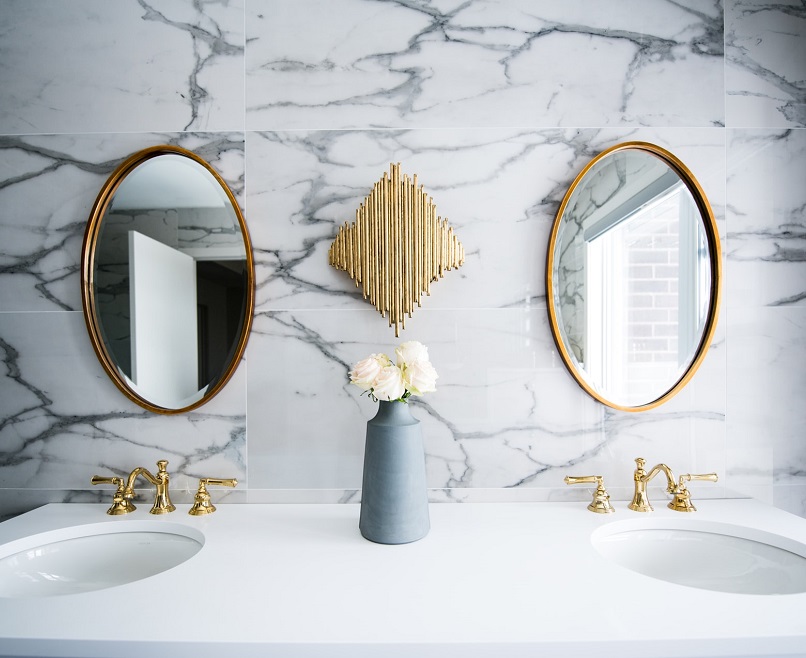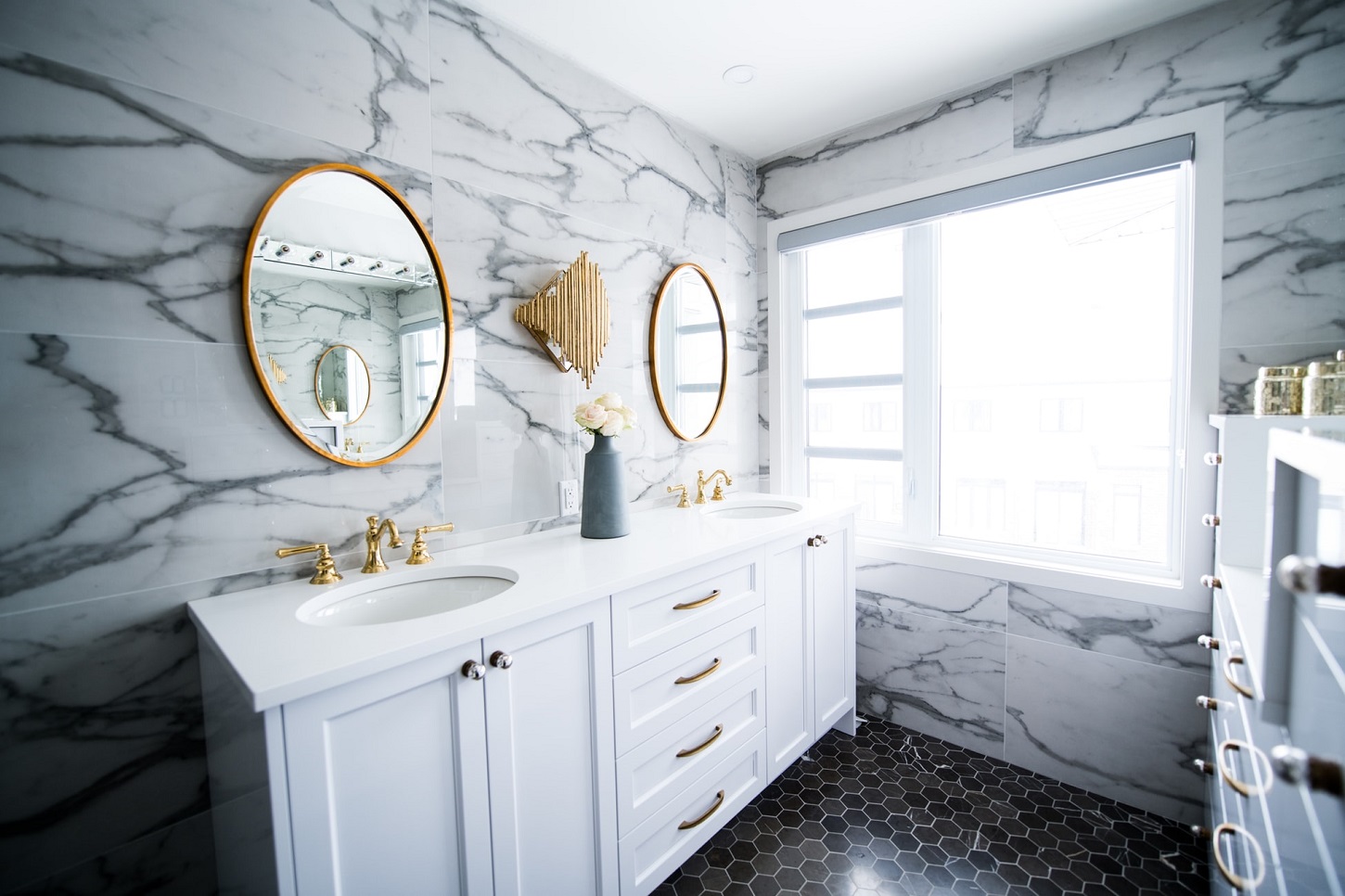A Guide to the Best Building Materials to Incorporate in Your Bathroom Renovation Project
When designing a custom bathroom, of course, you want your new space to be aesthetically pleasing and reflect your personality. But looks are not the only factors at play here.
Bathrooms pose a unique challenge from a design and building perspective, as all materials must withstand conditions unlike any other part of the home.
While you should have an idea of what your design will look like, your immediate preferences may not always guide your decisions since there are so many other non-aesthetic factors to consider that make up a successful bathroom renovation.
Read More: BRINGING LUXURY TO ANY BATHROOM
Read on for our guide on how aesthetics and function must work cohesively when it comes to bathroom renovations.
Considerations for Choosing Bathroom Materials
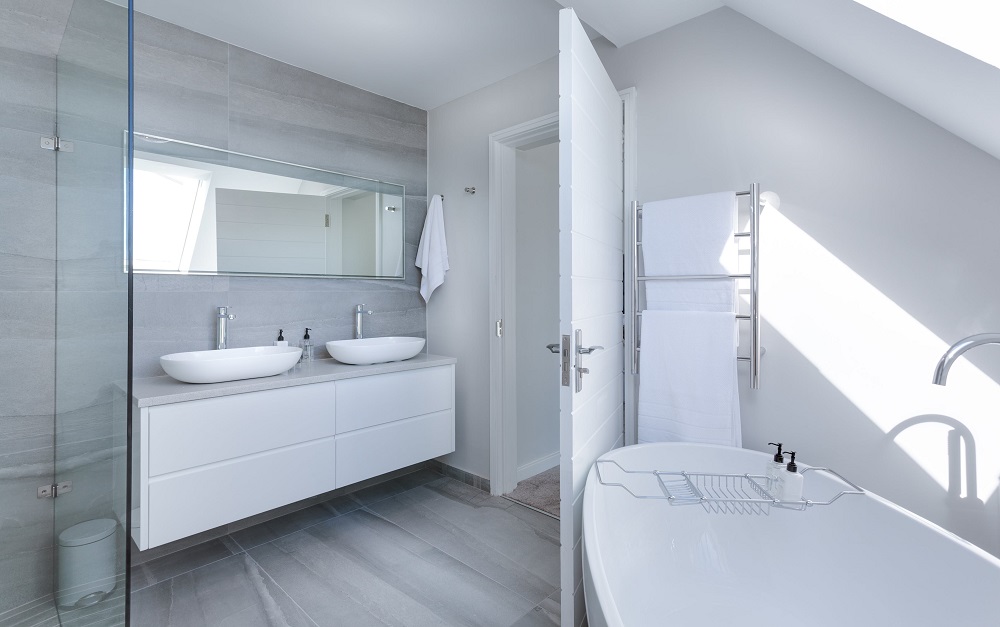
Modern, Victorian, bohemian – the options are endless!
Design
Your design preferences will heavily influence your materials, so before jumping into extensive renovations, take a step back and think long and hard about what it is that you are looking for in your new bathroom.
When meeting with your custom home contractor, come to the table with inspiration images in hand and explain your vision as clearly as possible to help ensure both sides are on the same page.
Moisture Resistance
This is perhaps the most important consideration you will need to account for when choosing bathroom materials. From showers, baths, and running tap water, bathrooms are constantly steamy and damp. For this reason, it is absolutely imperative that every design element in your bathroom – including your vanity, flooring, and walls – is able to withstand moisture.
Heat Resistance
After stepping out of the shower or bath, the warmth that fills the room often lingers, as evidenced by fogged-up mirrors and windows.
So, besides just moisture, your bathroom materials need to be durable enough to withstand heat from steam and hot hair tools that may be left out on the bathroom counter.
Among the most heat resistant materials are:
- Quartz
- Granite
- Marble
- Natural stone
- Ceramic tile
Easy to Clean
It’s no secret that bathrooms are breeding grounds for bacteria, so opt for materials that are easy to clean to help keep your bathroom germ, mould, and mildew free.
Some of the easiest to clean materials include:
- Larger tiles with thin grout lines
- Back-painted glass
- Porcelain tile
- Laminate
- Quartz
On the other hand, here are some examples of materials that tend to stain easily and are difficult to clean:
- Concrete
- Stone
- Small tiles
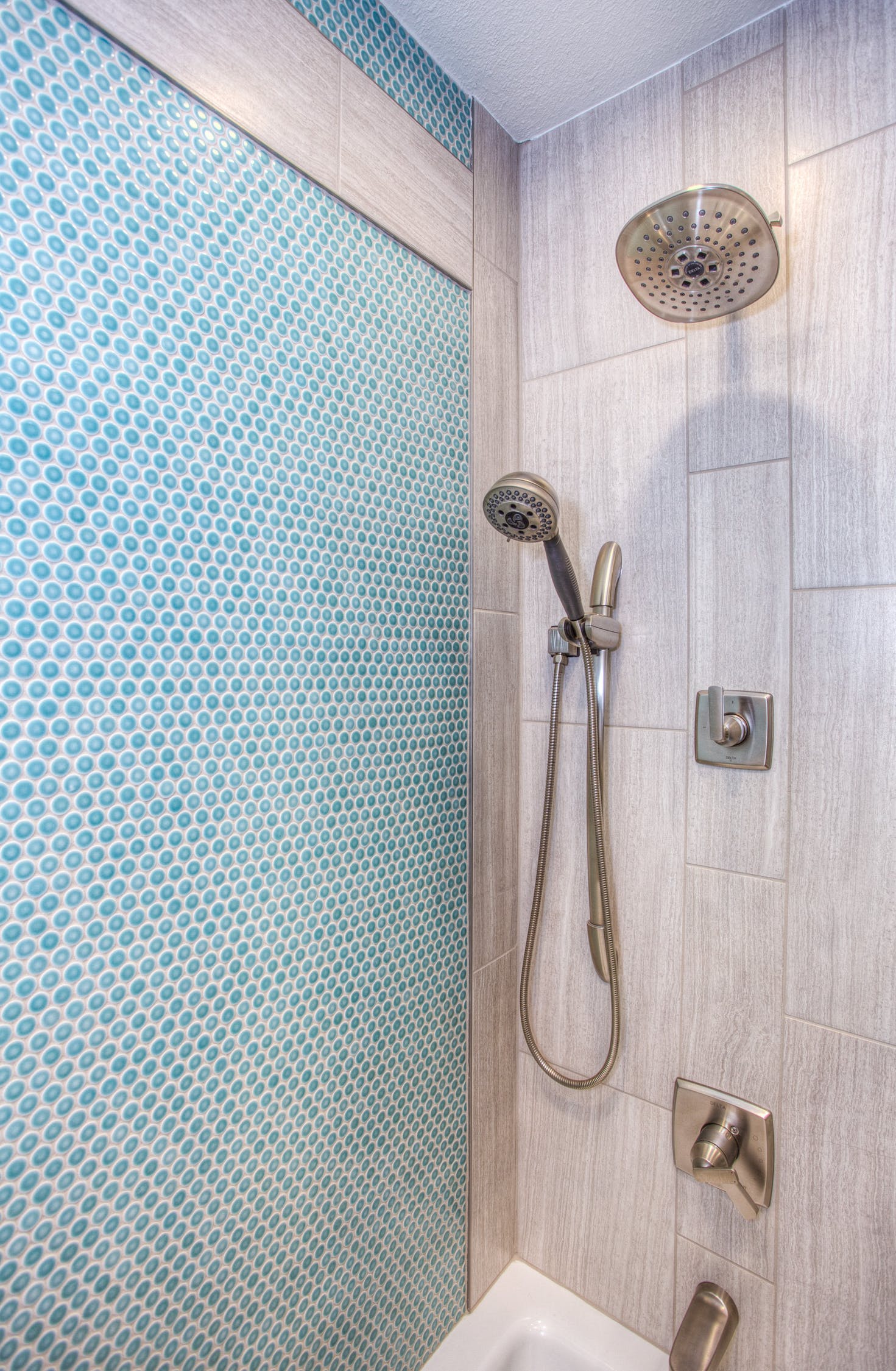
While beautifully detailed, smaller tiles tend to be a bit harder to keep clean
Picking Out Materials for Your Bathroom Remodel
Now that you know what to look for in bathroom materials, it’s time to start narrowing down your list.
As award-winning custom home contractors, we’re an excellent source of knowledge and can help you with this next phase in your bathroom renovation project. But to give you a better understanding of what you should be looking for, here are our tips for picking out materials for your bathroom remodel.
Flooring
When planning a bathroom remodel, one of the most important decisions you will make is choosing what type of flooring to install.
Durability is an important factor in this decision, along with moisture resistance, and slip resistance is to prevent unnecessary injury.
To help ensure your bathroom floor is slip-resistant and has some traction, look for flooring materials that have some texture to them.
And when researching different materials, don’t forget to search for information on how it will perform under stress – i.e. heavy foot traffic, heat, and water – and think about how easy it will be to clean. For example, tile tends to be more difficult to clean because of the grout, so if you’re a stickler for super clean floors, you may want to avoid smaller, more detailed tiles or avoid thick grout lines.
For easy-to-clean tiles, your best bet is to choose larger tiles with thin grout lines.
With that being said, here are some of the most popular bathroom flooring options:
- Ceramic tile
- Natural stone
- Vinyl
- Laminate
- Cork
Walls
Unlike floors, walls tend to be more forgiving when it comes to the elements of your bathroom. Because of this, you have a bit more flexibility when it comes to choosing wall materials.
However, you still need to make cognitive decisions when it comes to choosing materials that will make sure your walls are moisture-resistant to prevent things like mold, mildew, and rot.
Tiling is also a great choice for bathroom walls as it is often completely resistant to moisture and looks great from a design perspective.
Here are some common tiling options for bathroom walls:
- Subway tiles
- Mosaic tiling
- Beadboard
- Tileboard
- Natural stone tile
- Glass tile
- Porcelain tile
- Ceramic tile
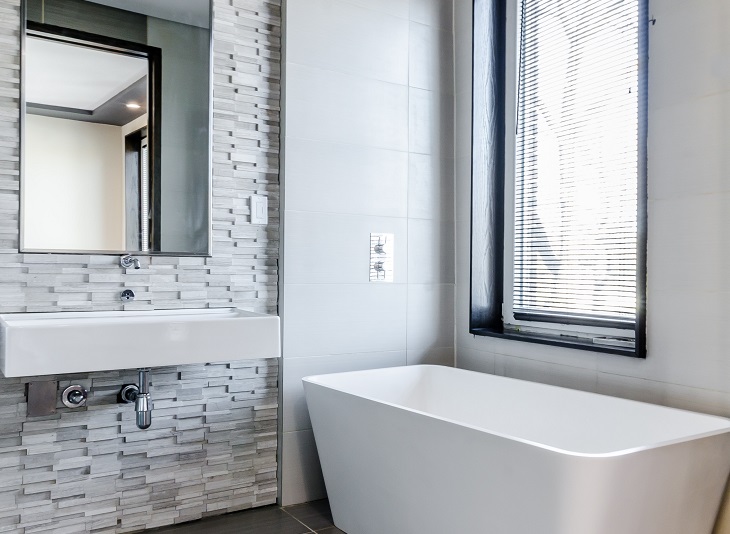
Mix and match your wall materials for a unique, layered look.
If you’re opting for a fresh coat of paint in a smashing new colour, always pick out a bathroom-specific paint that is both moisture and mildew resistant.
Countertops
Your vanity takes a heavy beating over the years, having to withstand soap, water, cosmetics, harsh cleaning products and hot hair tools on its surface. It also acts as a workstation during morning rush hour and likely won’t get a much-needed wipe down until later that day.
What does this mean for your bathroom renovation? Choosing a countertop that will hold up against whatever life (and your toiletry bag) throws at it. In other words, delicate, porous, easy-to-stain surfaces need not apply.
Some beautiful and durable options for bathroom counters that are also moisture resistant include:
- Granite
- Quartzite materials
- Laminate
- Thermofoil
Cabinets
Cabinets have a wonderful ability to dramatically change the entire look and feel of your bathroom. From two-tone to see-thru, they are the facelift of any bathroom remodel. While choosing the cabinets you truly love is important, you also want them to withstand the test of time, so durability is also key when narrowing down your choices.
Some popular options for bathroom cabinetry include:
- Solid wood
- Plywood
- Medium Density Fibreboard (MDF)
- PVC
Materials to Avoid
We’ve covered the basics when dealing with which materials work best in bathroom environments, but there are some that you should completely avoid at all costs.
Here are some examples of bathroom materials we absolutely do not recommend.

Don’t be a bathroom offender, avoid these mistakes!
Wallpaper
Yes, wallpaper is super trendy and can really liven up a room. But how is wallpaper removed? You guessed it – with steam! It goes without saying that you should avoid using this material in your bathroom because it will not withstand the constant steam and moisture. Over time, you’ll notice that your wallpaper will start to lift and peel.
Hardwood
While incredibly appealing from a design standpoint, hardwood isn’t an ideal choice for bathroom flooring because it tends to warp when exposed to prolonged periods of wet and steamy conditions.
Slippery/Glossy Stone or Tile
As we previously mentioned, avoid any flooring that can become slippery when wet (unless you have one of those yellow wet floor signs), as this creates a major hazard. Simply put – you’re just waiting for an accident to happen.
Some of the most slippery materials you should try to avoid include glossy stone like marble and porcelain, and enamel-coated tile.
Carpeting
This isn’t the 70’s. Carpet has no place in bathrooms. By installing carpeting in your bathroom, you are setting yourself up for a number of problems, as it absorbs moisture and leads to mold, mildew, and rot. Just say ‘no’ to carpet.
Thin Laminate
Although laminate floors can look fantastic and withstand wear and tear from children and pets, if this is something you want in your bathroom, be sure to choose a thicker vinyl laminate that can stand up to daily heat and moisture.
Thin laminate gradually separates, while wood core laminate buckles or discolours, allowing water to seep in between the boards and leading to serious, costly damage. So, be sure to ask which laminate flooring is specifically recommended for the bathroom.
The Takeaway
While designing a bathroom is not as cut and dry as other rooms in your home, with help from home building experts, you can achieve the bathroom you’ve always wanted without sacrificing your vision.
To help you design your dream bathroom that withstands the elements,
contact Sunter Homes today!
